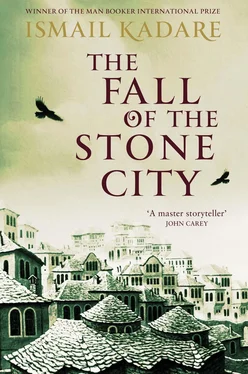People grew suspicious and gave the matter more consideration. Apparently there were two schools of thought in Albania as a whole. This fact made little impression on Gjirokastër. Everybody knew that there had been occasions when the city thought itself wiser than the rest of the country, and this case called for her wisdom, because it would fall to Gjirokastër, as the first large city through which the Germans would pass, to deal with them before anyone else.
The city had always had a reputation for arrogance. There were different explanations for this. Viewed in the most charitable light, its pride was an aspect of its isolation. The supporters of this theory, conscious of its obvious inadequacy, would hasten to add that “isolation” in this context required some qualification. The city was surrounded by a far-reaching hinterland with which it was on poor terms and the inhabitants of this hinterland considered the city alien, if not their actual enemy. At its back to the north, among the endless mountains full of foxes and wolves, lay the rugged and apparently innumerable villages of Labëria. To the east beyond the river and its valley lay the villages of Lunxhëria, which were also irritating to the city but for the opposite reason: because of their gentleness. Then there were the Greek-minority villages stretched along both sides of the river valley to the south. The Greek peasants who worked the land as sharecroppers were treated with disdain but perhaps provoked the city even more. The subtle irritation they caused was felt more during the hours of sleep than by day, and there was no reason for it at all. The presence of these Greeks was like a temptation to sin, leading the residents of the city into prejudiced opinions against not only the Greeks, but Hellenism as a whole, the state of Greece, its politics, and even its language.
To complicate this patchwork further, in the very middle of the territory, or more precisely between the city and the Greek-minority area, lay Lazarat, the most stubborn and vicious village imaginable. Historians, unable to account for its rancour towards Gjirokastër, said only that this malice did no harm, as long as the city bore the brunt of it and prevented it from seeping further into Albania.
It was said that on dark nights the lights of Gjirokastër, though faint and distant, so irked the villagers of Lazarat that they fired guns in the direction of the stone city.
According to other more cautious chroniclers, the origin of this enmity lay in the tall houses in whose upper storeys the ladies of the city were believed to live. Behind the roughcast walls, the ladies observed their own unbending rituals. Rarely seen in public, they were the city’s secret rulers.
The city itself was inured to all this and sought neither conciliation nor agreement with anyone. Faced with such general hostility, any other city might perhaps have attempted to ally itself with one neighbour against another, for instance with Labëria against the Greek minority or Lazarat against Lunxhëria. But Gjirokastër was not as wise as it should have been. Or perhaps it was wiser. It came to the same thing.
Not only did the city refuse conciliation, as a warning it illuminated its prison at night. This prison was inside the castle, at the stone city’s highest point. With this baleful light, which travellers compared to a malignant version of the floodlit Acropolis of Athens, Gjirokastër sent its message to its entire hinterland, Labëria, Lazarat, Lunxhëria, and the Greeks: here you will all rot, without distinction, without mercy.
This threat was not an idle one if one remembered the three hundred imperial judges — unemployed since the fall of the Ottoman Empire — who bided their time at home.
The reinstatement of these pitiless judges would turn even the most sweet-tempered of cities, let alone Gjirokastër, into a wild beast. People were heard to say that if even Lunxhëria exerted her charms in vain, nothing could mollify this city. The lights of the churches of Lunxhëria twinkled and their bells pealed at Easter and their women and their freshwater springs were of rare sweetness. The stone city was not as blind as it appeared; it took note of everything. Sometimes girls or young brides vanished from the villages of Lunxhëria. Their neighbours searched for them everywhere, in the streams, in ravines and among the shepherds’ shielings. Eventually a soft sigh like the rustle of silk would suggest firmly that they must have ended up in the tall houses of the city.
It was never proved whether men of the city had in fact abducted these women. Were the girls kidnapped or had they drifted like butterflies, of their own free will, close to the formidable gates of the houses, until one day they were sucked in, never to emerge again. Nobody knew what went on inside. Were they wretched there or happy? Perhaps their dream of becoming ladies had come true. Or perhaps they themselves had been only a dream, and nothing else.
This was how things stood just before the Germans arrived. The old conviction that Albania, when faced with danger, would come to its senses and forget its internal strife proved ill-founded.
Three days before the vanguard of the Wehrmacht crossed the state frontier, the situation was as follows. The villages of Lunxhëria with their sweet springs and lovely girls closed in on themselves and seemed determined to take no notice of the Germans. Their main concern in any invasion was the forcible seizure of brides; the reports that the Germans were not noted for this (and indeed, at least according to the leaflets dropped from the sky, would respect the traditional Albanian virtues) was sufficient to allay any fears of what would come from foreign occupation.
The Greek minority, seeing that this army had crushed the state of Greece, kept their heads down and prayed to God they would not be noticed. But for the villagers of Lazarat, the very fact that the Germans had thrashed the Greeks, whom they could not abide under any circumstances, was enough if not to arouse their admiration, at least to soften any animosity against the aggressors.
In Labëria the situation was different. The villagers’ opinions for or against communism were transformed instantly into feelings for or against the Germans. As always, when they ran out of arguments they reached for their guns. As they had more bullets than words there was little chance of an end to the quarrel.
The same questions that were fought over with such commotion and brutality in the villages of Labëria were debated more delicately in the city of Gjirokastër itself. In its elegant third-floor drawing rooms, binoculars were passed from hand to hand to observe the main road along which “the war was coming”.
There were two schools of thought. As expected, the communists were calling for war, fervently, and soon. The nationalists were not opposed to war but were not inclined to either fervour or haste. In their view excessive zeal was more characteristic of Russia than Albania and there was no reason why Albania should rush into war blindly, without considering her own advantage. Germany was indeed an invader, but Red Russia was no better. Besides, Germany was bringing home Kosovo and Çamëria, while Russia offered nothing but collective farms. In contrast, the words “ethnic Albania” in the German leaflets not only failed to conciliate the communists but actually provoked them. Their impatience for war probably did come from Russia. This was only natural for they were led by two or three Serbian chiefs for whom the phrase “ethnic Albania” was a red rag and worse.
These opinions changed with every passing hour and were expressed most bluntly in the city’s cafés. On one sentiment everyone could agree. Pass through, Mr Germany, like you promised, in transit. Don’t provoke us, and we won’t provoke you. Achtung! You’ve already thrashed Greece and Serbia. That’s your business! Give us Kosovo and Çamëria, jawohl!
Читать дальше












